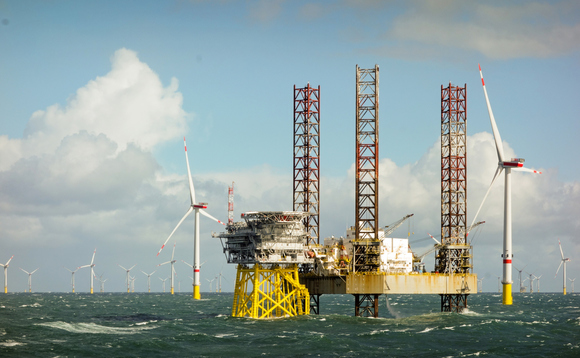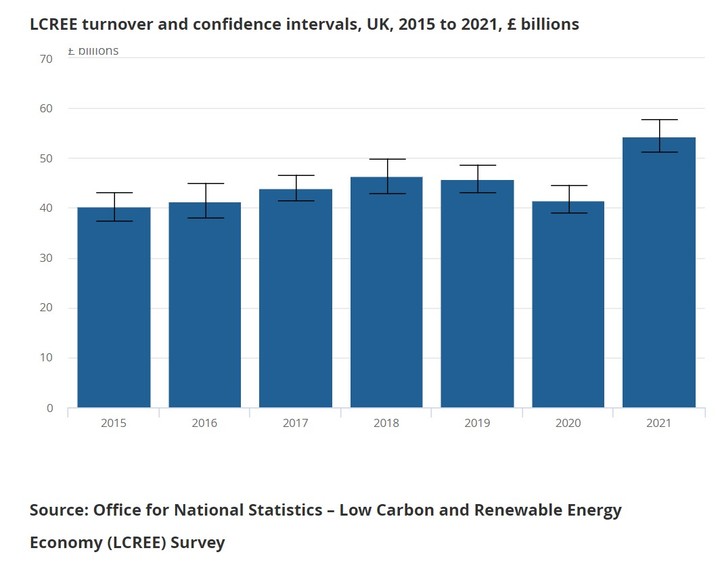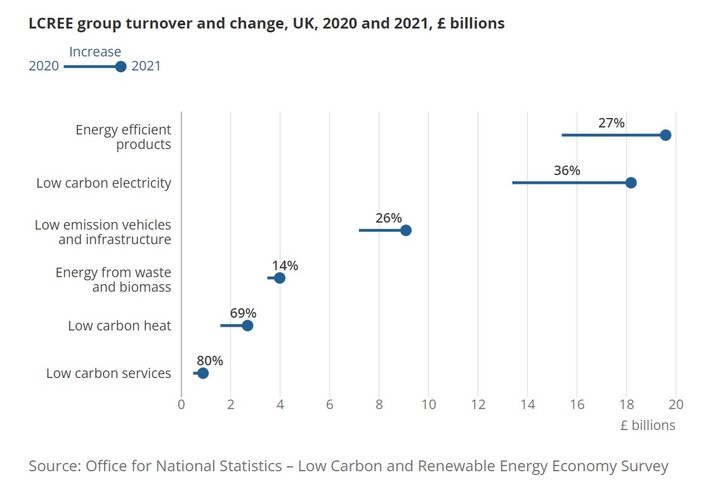
The UK's green economy enjoyed a bumper 2021, according to official new data from the Office for National Statistics (ONS) that confirms both turnover and employment hit their highest level since records began in 2015.
The ONS annual report on the Low Carbon and Renewable Energy Economy (LCREE) shows that revenues across the sector rose 30.8 per cent in 2021 to £54.4bn, despite considerable Covid-related disruption. Employment also increased by 16.4 per cent over the period to 247,400 employees.
Launched in 2015, the LCREE data set covers a range of clean tech industries, such as energy efficient products, low carbon electricity, low emissions vehicles and infrastructure, low carbon heat, and low carbon services.
The data is based on a sample of around 25,000 businesses that garnered a response rate of 65 per cent, with the ONS drawing on responses from more than 3,000 businesses that it classified as being active in the LCREE.
Consequently, some other analysts have argued the green economy is considerably larger than the ONS' estimates suggest, given industries that are key to decarbonisation but do not specifically work in low carbon energy could be incorporated.
However, the latest ONS data provides further evidence that the clean energy, electric vehicle, and energy efficiency markets in particular are continuing to grow rapidly and are comfortably outperforming the wider UK economy, despite on-going economic headwinds.

According to the report, the turnover for businesses in the energy efficient products market rose 27 per cent to almost £20bn, while the low carbon electricity sector saw revenues surge 36 per cent to just over £18bn. Low emissions vehicles and infrastructure also saw revenues grow by more than a quarter to over £9bn.
"The energy efficient products group also had the largest LCREE employment in 2021, at 138,300," the ONS said. "The low emission vehicles and infrastructure group saw the largest employment increase, from 21,400 full time employees (FTEs) in 2020 to 36,500 in 2021."
In addition, the data reveals a boom in green construction with LCREE employment in the sector rising 19 per cent to 91,000 FTEs.

The ONS said that while a proportion of the observed increase in revenues and employment "could be attributed to the recovery of the UK economy from the coronavirus pandemic, this is not likely to be the whole picture".
UK GDP growth in 2021 hit 7.5 per cent as the economy bounced back from the Covid lockdowns of 2020, which suggests the LCREE's growth rate comfortably outperformed the wider economy once again.
The update from the ONS comes amidst a growing political debate over how to accelerate the development of the UK's green economy at a time when both the US and EU are announcing ambitious new programmes to stimulate investment in clean tech manufacturing and infrastructure.
Responding to today's figures, Luke Murphy, associate director for the energy, climate, housing, and infrastructure team at think tank IPPR, said the UK's performance was "unspectacular" when placed in an international context.
"Today's ONS assessment shows that the UK risks falling behind in the global green race, just as our allies and economic competitors such as the United States are unleashing significant interventions to boost their economies and accelerate towards net zero," he said. "While the growth in the low-carbon and renewable economy is positive, overall, the UK's progress in growing the green economy over the best part of a decade has been decidedly unspectacular. It's estimated that there are thousands fewer businesses operating in these sectors than in 2014, and the number of jobs has only increased by five per cent over the same period.
"Before the UK falls out of the race altogether, the UK government needs to step up public investment, offer longer term and more ambitious policies from energy efficiency to clean transport, and back them with a serious green industrial strategy. Failure to do so will see the UK fall behind economically and undermine our progress towards our climate goals."
The ONS report comes a day after a coalition of British clean tech investors launched a new trade body, Cleantech for UK, to promote the country's fast expanding clean tech sector and venture capital community.
Backed by Bill Gates' Breakthrough Energy investment vehicle and organised by analyst firm Cleantech Group, the new initiative debuted at a summit at Imperial College attended by both Gates and Prime Minister Rishi Sunak.
Speaking after the event Gates said: "The UK has all the ingredients to become a major player in the global push to build a net zero emissions future, including world-class research facilities and forward-looking investors. It's great to see cleantech businesses, innovators, and policy makers coming together to advance UK climate leadership."
Sunak also highlighted the growing significance of the clean tech sector to the UK economy. "Investing in renewables and clean tech is one of the best ways to strengthen our energy security, create better-paid jobs and grow the economy," he said. "A new generation of talented British businesses can be confident that they have the backing they need to unlock green solutions to some of the biggest challenges we face."
However, the government continues to face questions over the effectiveness of its support for emerging clean tech industries, which were further fuelled this week by news Ford is to cut 1,300 jobs in the UK as it continues to accelerate its transition towards a fully electric portfolio.